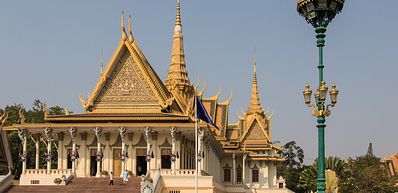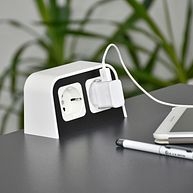
-
![ambulance toy on a white table]() Provided by: Zhen H/Unsplash
Provided by: Zhen H/Unsplash

Our travel guides are free to read and explore online. If you want to get your own copy, the full travel guide for this destination is available to you offline* to bring along anywhere or print for your trip.
*this will be downloaded as a PDF.Price
€4,95
Health and Safety Advice
The guide was updated:While vaccinations are not mandatory for entering Cambodia, they are highly recommended, along with bringing essential medications from home, as they may not be readily available in Phnom Penh.
It's crucial to have comprehensive travel insurance as healthcare in Cambodia can be costly, with upfront payments required, posing significant challenges in emergencies. Stay safe by avoiding tap water, opt for bottled water instead. Be sure to also pack (or buy there) an insect repellent to fend off mosquito-borne diseases.
Useful Information
Digital Travel Guide Download
Our travel guides are free to read and explore online. If you want to get your own copy, the full travel guide for this destination is available to you offline* to bring along anywhere or print for your trip.
*this will be downloaded as a PDF.Price
€4,95

Cambodia has rainy weather for half of the year and dry weather for the other half. The seasons can be subdivided into dry-cool (November-January), dry-hot (February-May), rainy-hot (May-September) and rainy-cool (October-November). You will find the best weather in the dry-cool season, with an overall average temperature of 26°C—this is the most popular time to go.
The rainy-cool season can be an alternative if you want to avoid the crowds of tourists—the green landscapes boast beautiful colours during this time. However, so much rain might be uncomfortable for some, and if you are planning day trips, be aware that water may flood the streets and make it impossible to reach smaller, remote places. The rainiest months are August and September.
Read more

Passport / Visa
Visas to Cambodia are available at airports and land borders, as well as online for citizens of most countries. In order to obtain one, make sure you can provide a passport valid for at least six months and a passport-sized photo for your visa. Visitors from an ASEAN member country do not need a visa to enter Cambodia, as long as they have a valid passport.
It's essential for travellers to check the latest visa requirements and entry regulations from the nearest Cambodian embassy or consulate or through official government channels before planning their trip to Cambodia.
Read more

Phnom Penh International Airport (PNH)
Phnom Penh International Airport (PNH) lies approximately 10 km from the city centre. The easiest way to get to and from the airport is by taxi. It takes around 20-40 minutes depending on traffic. You can also take a tuk-tuk. Whatever alternative you choose, you can buy a coupon inside the airport terminal to avoid the hustle outside.
Read more

Health and Safety Advice
While vaccinations are not mandatory for entering Cambodia, they are highly recommended, along with bringing essential medications from home, as they may not be readily available in Phnom Penh.
It's crucial to have comprehensive travel insurance as healthcare in Cambodia can be costly, with upfront payments required, posing significant challenges in emergencies. Stay safe by avoiding tap water, opt for bottled water instead. Be sure to also pack (or buy there) an insect repellent to fend off mosquito-borne diseases.
Read more

Public Transport
Although many visitors still often use tuk tuks, cyclos or taxis to move around the city, the municipality of Phnom Penh has recently re-opened the 'Phnom Penh City Bus', an efficient public bus service that is a bit slower, but more comfortable than the alternatives. Moreover, they don't require you to negotiate prices with the driver, as other means of transport do. Bus tickets are cheap, and you can find transport apps on your phone.
Read more

Tuk Tuks, Cyclos & Motorbikes
Navigate the bustling streets of Phnom Penh with ease by opting for traditional modes of transportation like tuk-tuks or cyclos. Tuk-tuks, a motorised vehicle common in Cambodia, offer convenient and flexible travel options, though agreeing on a price beforehand is essential. Alternatively, cyclos, typically operated by elderly countryside dwellers, offer a slower but more scenic journey through the city at a slightly lower cost than moto-taxis. For added convenience, phone apps are available to hail tuk-tuks and taxis. While motorbike rides are popular for exploring, caution is advised due to the city's chaotic traffic and lax adherence to road regulations.
Read more

Taxi
There are two types of taxis in Phnom Penh, those with a meter and those without. You can find them outside major hotels or close to the tourist attractions. If you choose a taxi without a meter, always agree on a price before you start the journey.
Phnom Penh Taxi
+855 17 757 800
Phnom Penh Taxi Drivers
+855 92 994 227
Read more

Post
At the main post offices in the city, you can buy stamps and receive help for sending parcels. Always watch the carrier put the stamp on your postcard, letter, or parcel, otherwise, there might be a risk it will not reach its destination.
Read more

Pharmacy
One of the biggest pharmacies in Phnom Penh is Pharmacie de la Gare, which is located next to the railway station at:
124, Preah Monivong Boulevard (93), Phnom Penh
+855 92 711 771
Opening hours: daily 8am–7pm
UCare Pharmacy is part of a recently opened pharmacy chain and offers one of the largest stock of medicine (from France) in town.
Read more

Telephone
Country code: +855
Area Code: 23
Read more

Electricity
230 V, 50Hz
Read more


